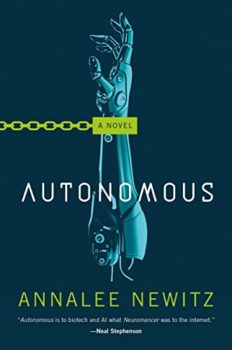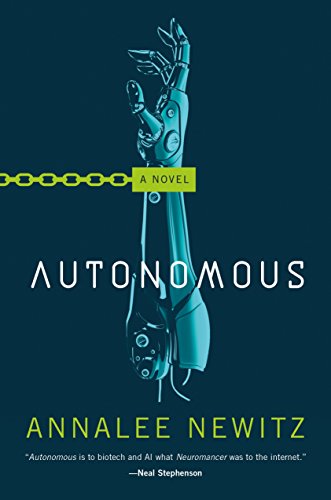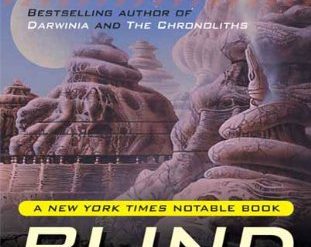
Estimated reading time: 5 minutes
You hope the world will never look like this. It’s 2144. Slavery has revived, camouflaged as indentured servitude. Theoretically, the indenture is limited to a specified term; in practice, contract owners frequently refuse to honor the commitment. Millions of humans and robots alike are trapped in these unbreakable contracts. Only rarely do people escape, and autonomous robots are rare. This is the world imagined by Annalee Newitz in her intriguing new science fiction novel, Autonomous.
The all-powerful pharmaceutical industry
Bioengineering is supreme. The pharmaceutical industry, and the lives of most of the world’s citizens, are dominated by a handful of huge pharma corporations. These companies produce patented drugs that lengthen lifespan, enhance productivity, and induce euphoria as well as prevent illness. Unfortunately, officially sanctioned drugs are far too expensive for most of the world’s people. A flourishing pirate economy fills some of the gaps by reverse-engineering the most popular drugs. To combat the pirates and enforce patent law, the paramilitary International Property Coalition (IPC) sends teams of agents around the world to capture or kill the practitioners of “black pharma.”
Autonomous by Annalee Newitz (2017) 298 pages ★★★★★
Finalist for the 2018 Nebula Award for Best Novel
Autonomous robots figure prominently in this provocative novel
IPC Agent Eliasz Wójcik is partnered with an indentured military robot named Paladin. They work out of a large military base operated by the African Federation. The pair is charged with hunting down a notorious pirate known as Jack, who appears to be somewhere in the Arctic. In fact, as the novel opens, Jack (real name: Judith Chen) is traveling on a submarine along the Arctic coast “beyond the Beaufort Sea.”
Jack has learned that a batch of a new, reverse-engineered drug she had unloaded in Calgary is causing sometimes-lethal side effects. She is on a mission of her own—to develop an antidote. Jack knows that the small batch of black-market drugs she distributed is only a minor part of the problem: the official drug, a product of Zaxy, one of the world’s largest pharmacorps, is in use as a productivity-enhancer at large corporations that can afford to pay its high price. Jack sees it as her responsibility to identify Zaxy as the source of the problem, get the word out worldwide, and make an antidote freely available. Eliasz and Paladin are determined to stop her.
Bioengineering and robotics are supreme
Robotics has advanced in tandem with bioengineering. Now, robots may take on an unlimited variety of shapes, sizes, and forms. Biobots closely resemble humans and include both biological and manufactured materials. Other robots, only vaguely humanoid, possess human brains to supplement their cybernetic capabilities. Yet others may be configured as insects, birds, or machines. Paladin, for example, appears roughly humanoid but has automatic weapons concealed in its chest and arms as well as a human brain in its midsection. However, Paladin is much more than a military machine: it communicates both by vocalizing and wirelessly, it is curious and continuously absorbs new information—and it hopes to gain its freedom from indenture and join the ranks of autonomous robots.
Climate change has upended geopolitics
Politics in the world of 2144 is as dramatically changed as economics. Climate change and epidemic disease have upended the geopolitical order, leaving the United States a backwater and Europe frozen, in the absence of the Gulf Stream. The world’s dominant powers are the Asian Union, the Brazilian States, and the African Federation, where most of the advanced biotech companies conduct their research. North America is a Free Trade Zone, with its most prosperous cities in the summery Canadian and Alaskan Arctic. It’s there that most of the action in Autonomous takes place.
Known primarily as a blogger and science journalist, Annalee Newitz is the author of five books of nonfiction. Although she has previously published science fiction short stories, Autonomous is her first novel. Newitz holds a Ph.D. from the University of California, Berkeley, in English and American Studies and was on the Cal faculty for a time. She now writes full-time.
For related reading
I have also two of Newitz’s other novels and two of her nonfiction books:
- The Future of Another Timeline (Alternate feminist history by a gifted science fiction author)
- The Terraformers (A hopeful future in this brilliant new novel)
- Scatter, Adapt, and Remember (Will the human race survive climate change and a mass extinction?)
- Four Lost Cities: A Secret History of the Urban Age (Join archaeologists at work around the world)
This novel is included in:
- 20 good nonfiction books about the future
- Two dozen good books about artificial intelligence
- The decade’s top 10 historical novels, mysteries & thrillers, and science fiction
- Good books by Berkeley authors
For more good reading, check out:
- These novels won both Hugo and Nebula Awards
- The ultimate guide to the all-time best science fiction novels
- 10 top science fiction novels
- The top 10 dystopian novels
- 10 new science fiction authors worth reading now
And you can always find my most popular reviews, and the most recent ones, on the Home Page.



























